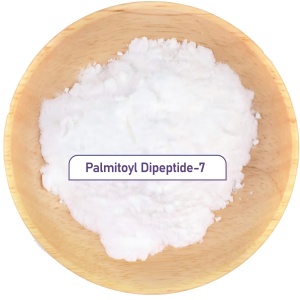Palmitoyl Dipeptide-7:Hydration and barrier repair peptide

Palmitoyl Dipeptide-7 is a synthetic signal peptide gaining traction in advanced skincare formulations for its ability to enhance skin resilience, promote hydration, and support barrier repair. It consists of a dipeptide structure conjugated with a palmitoyl group, improving both skin penetration and bioavailability. This molecule is widely used in moisturizers, anti-aging serums, and products targeting skin sensitivity.
Scientific Basis and Peptide Structure
The molecular design of Palmitoyl Dipeptide-7 enables it to mimic the natural processes of skin repair and renewal. By combining specific amino acids with a fatty acid chain, the peptide is able to communicate with skin cells, especially keratinocytes and fibroblasts, to trigger beneficial biological responses. This signal peptide structure is key to its effectiveness in low concentrations.
Role in Cellular Communication
Palmitoyl Dipeptide-7 functions as a messenger, signaling skin cells to stimulate the synthesis of proteins and lipids essential for maintaining a healthy barrier. This includes ceramides, collagen, and elastin—components that collectively keep the skin plump, elastic, and moisturized.
Enhanced Bioavailability via Lipophilic Modification
The palmitoyl moiety allows this peptide to integrate easily into the lipid layers of the skin, ensuring effective transport to deeper layers. This increases both stability and efficacy, making it suitable for long-term topical applications with visible results.
Moisture Retention and Barrier Repair
One of the most appreciated benefits of Palmitoyl Dipeptide-7 is its ability to improve skin moisture levels. It reduces transepidermal water loss (TEWL) by supporting lipid barrier restoration, which is particularly beneficial in dry, mature, or environmentally stressed skin.
Boosting Natural Moisturizing Factors (NMFs)
This peptide has shown efficacy in increasing the production of NMF components such as amino acids and lactic acid. These substances naturally occur in the skin and are crucial for maintaining hydration and softness.
Reducing Sensitivity and Inflammation
Clinical and in vitro studies suggest that Palmitoyl Dipeptide-7 can calm reactive skin by downregulating pro-inflammatory mediators. It is often included in formulas intended for sensitive skin, rosacea, or post-procedure care due to its soothing action.
Anti-Aging Effects and Skin Firmness
In addition to hydration, this peptide supports anti-aging strategies by improving dermal structure and elasticity. It encourages the production of structural proteins that diminish with age, helping to reduce the appearance of fine lines and sagging skin.
Improving Skin Tone and Texture
With regular use, Palmitoyl Dipeptide-7 can lead to smoother skin texture and more even tone. This is attributed to its role in accelerating skin renewal and supporting healthy cell turnover, which gradually minimizes dullness and rough patches.
Complementing Other Active Ingredients
This peptide is highly compatible with antioxidants (like vitamin C), hydrators (such as hyaluronic acid), and barrier-enhancing ingredients (like niacinamide). These synergies allow for powerful multi-functional formulas without the risk of irritation.
Application and Usage Guidelines
Palmitoyl Dipeptide-7 is stable in both water-based and oil-based formulations. It works well in emulsions, serums, ampoules, and masks. Its flexibility makes it a valuable component in both day and night skincare products aimed at improving hydration and skin comfort.
Recommended Dosage in Formulations
Cosmetic manufacturers typically use the peptide in concentrations ranging from 0.5% to 2.0%, depending on the desired function. It is non-irritating and suitable for everyday use, even for those with highly sensitive or allergy-prone skin.
Packaging and Shelf Stability
To maintain its activity, products containing Palmitoyl Dipeptide-7 are best packaged in airless containers or dark bottles to prevent oxidation and degradation. The peptide remains stable across a wide pH range, especially from 4.5 to 7.0, making it easy to incorporate into a variety of skincare systems.
Market Relevance and Future Potential
With consumers increasingly demanding scientifically backed ingredients that support skin health rather than mask issues, Palmitoyl Dipeptide-7 represents a modern, holistic approach to skincare. Its multifunctionality aligns with minimalistic beauty trends, where fewer ingredients deliver broader benefits.
Clean Beauty and Sustainability Alignment
This synthetic peptide fits into clean beauty formulations due to its non-animal origin, well-documented safety profile, and non-toxic nature. It supports sustainable beauty by offering long-term skin support without the need for aggressive treatments.
Opportunities for Innovation
Brands can explore combining this peptide with microbiome-friendly ingredients or encapsulation systems to further enhance efficacy and skin affinity. Given its safety and versatility, it holds promise for innovations in both preventative and corrective skincare solutions.
